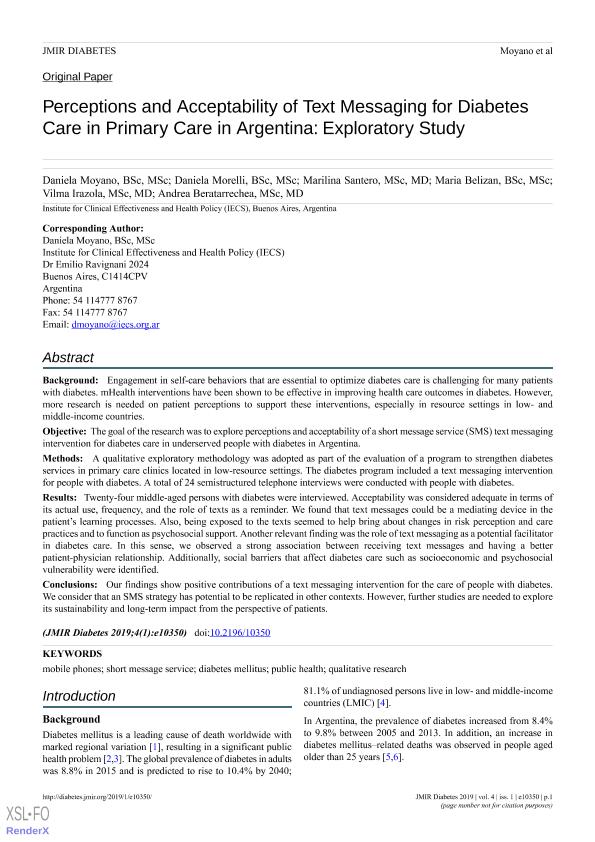Mostrar el registro sencillo del ítem
dc.contributor.author
Moyano, Daniela Luz

dc.contributor.author
Morelli, Daniela
dc.contributor.author
Santero, Marilina

dc.contributor.author
Belizan, Maria

dc.contributor.author
Irazola, Vilma

dc.contributor.author
Beratarrechea, Andrea Gabriela

dc.date.available
2021-12-03T17:03:56Z
dc.date.issued
2019-03
dc.identifier.citation
Moyano, Daniela Luz; Morelli, Daniela; Santero, Marilina; Belizan, Maria; Irazola, Vilma; et al.; Perceptions and acceptability of text messaging for diabetes care in primary care in Argentina: Exploratory study; JMIR Publications; JMIR Diabetes; 4; 1; 3-2019; 1-9
dc.identifier.issn
2371-4379
dc.identifier.uri
http://hdl.handle.net/11336/148150
dc.description.abstract
Background: Engagement in self-care behaviors that are essential to optimize diabetes care is challenging for many patients with diabetes. mHealth interventions have been shown to be effective in improving health care outcomes in diabetes. However, more research is needed on patient perceptions to support these interventions, especially in resource settings in low- and middle-income countries. Objective: The goal of the research was to explore perceptions and acceptability of a short message service (SMS) text messaging intervention for diabetes care in underserved people with diabetes in Argentina. Methods: A qualitative exploratory methodology was adopted as part of the evaluation of a program to strengthen diabetes services in primary care clinics located in low-resource settings. The diabetes program included a text messaging intervention for people with diabetes. A total of 24 semistructured telephone interviews were conducted with people with diabetes. Results: Twenty-four middle-aged persons with diabetes were interviewed. Acceptability was considered adequate in terms of its actual use, frequency, and the role of texts as a reminder. We found that text messages could be a mediating device in the patient's learning processes. Also, being exposed to the texts seemed to help bring about changes in risk perception and care practices and to function as psychosocial support. Another relevant finding was the role of text messaging as a potential facilitator in diabetes care. In this sense, we observed a strong association between receiving text messages and having a better patient-physician relationship. Additionally, social barriers that affect diabetes care such as socioeconomic and psychosocial vulnerability were identified. Conclusions: Our findings show positive contributions of a text messaging intervention for the care of people with diabetes. We consider that an SMS strategy has potential to be replicated in other contexts. However, further studies are needed to explore its sustainability and long-term impact from the perspective of patients.
dc.format
application/pdf
dc.language.iso
eng
dc.publisher
JMIR Publications
dc.rights
info:eu-repo/semantics/openAccess
dc.rights.uri
https://creativecommons.org/licenses/by-nc-sa/2.5/ar/
dc.subject
DIABETES MELLITUS
dc.subject
MOBILE PHONES
dc.subject
PUBLIC HEALTH
dc.subject
QUALITATIVE RESEARCH
dc.subject
SHORT MESSAGE SERVICE
dc.subject.classification
Salud Pública y Medioambiental

dc.subject.classification
Ciencias de la Salud

dc.subject.classification
CIENCIAS MÉDICAS Y DE LA SALUD

dc.title
Perceptions and acceptability of text messaging for diabetes care in primary care in Argentina: Exploratory study
dc.type
info:eu-repo/semantics/article
dc.type
info:ar-repo/semantics/artículo
dc.type
info:eu-repo/semantics/publishedVersion
dc.date.updated
2021-01-04T14:32:55Z
dc.journal.volume
4
dc.journal.number
1
dc.journal.pagination
1-9
dc.journal.pais
Canadá

dc.journal.ciudad
Toronto
dc.description.fil
Fil: Moyano, Daniela Luz. Instituto de Efectividad Clínica y Sanitaria; Argentina
dc.description.fil
Fil: Morelli, Daniela. Instituto de Efectividad Clínica y Sanitaria; Argentina
dc.description.fil
Fil: Santero, Marilina. Instituto de Efectividad Clínica y Sanitaria; Argentina
dc.description.fil
Fil: Belizan, Maria. Instituto de Efectividad Clínica y Sanitaria; Argentina
dc.description.fil
Fil: Irazola, Vilma. Consejo Nacional de Investigaciones Científicas y Técnicas. Oficina de Coordinación Administrativa Parque Centenario. Centro de Investigaciones en Epidemiología y Salud Pública. Instituto de Efectividad Clínica y Sanitaria. Centro de Investigaciones en Epidemiología y Salud Pública; Argentina
dc.description.fil
Fil: Beratarrechea, Andrea Gabriela. Consejo Nacional de Investigaciones Científicas y Técnicas. Oficina de Coordinación Administrativa Parque Centenario. Centro de Investigaciones en Epidemiología y Salud Pública. Instituto de Efectividad Clínica y Sanitaria. Centro de Investigaciones en Epidemiología y Salud Pública; Argentina
dc.journal.title
JMIR Diabetes
dc.relation.alternativeid
info:eu-repo/semantics/altIdentifier/url/http://diabetes.jmir.org/2019/1/e10350/
dc.relation.alternativeid
info:eu-repo/semantics/altIdentifier/doi/http://dx.doi.org/10.2196/10350
Archivos asociados
